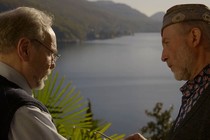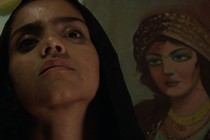Sonita, music as a possible escape route
- Iranian director Rokhsareh Ghaem Maghami’s latest film has its world premiere at the International Documentary Film Festival Amsterdam

Four years on from Going up the Stairs, Rokhsareh Ghaem Maghami returns to International Documentary Film Festival Amsterdam to unveil her latest documentary Sonita [+see also:
trailer
film profile], a co-production between Germany, Switzerland and Iran.
Sonita, in line with its predecessor, paints the portrait of a woman (or rather, a young girl) suffocated by a hyper-conservative society that imposes nefarious and intolerable standards on its citizens. Whilst Akram paints in silence, swallowed up by a life meticulously planned out to the smallest detail, the young Sonita innocently and bravely lives out her dream of becoming a famous rapper in the open. Whilst Going up the Stairs frees the life of its protagonist, Sonita shows us a possible escape route before the insufferable happens.
Over three years Rokhsareh Ghaem Maghami follows her protagonist, a young 18-year-old Afghan refugee who has found a sort of refuge in a community centre for children in Teheran. There, in what seems like a safe little oasis far removed from the chaos that is her life, Sonita screams out her rebellion through the notes of her hip-hop compositions. For now her audience is limited to the other kids at the community centre, but what does it matter? Sonita is used to dreaming, to running away from her problems through creativity. On the one hand there’s reality, on the other the dreams in which she seeks refuge, made up of majestic and innocent collages in which music is omnipresent and her origins turned upside down. Rokhsareh Ghaem Maghami’s documentary makes us realise the importance of creativity as a privileged space in which to rest our minds when they are (literally as well as figuratively) bombarded with a thousand doubts, by an endless series of unanswered questions.
Although the documentary starts off in the most classic of ways, with the camera following Sonita in her everyday movements between home and the community centre, the intimate relationship that the director gradually forges with her protagonist (there are no voiceovers but there are frequent exchanges between the director and Sonita), leads the documentary onto a dangerous and unexpected plane. To what extent can the intrusion of the director in the world she’s documenting be tolerated? This is the question that we find ourselves asking with increasing insistency as the film goes on. Although Rokhsareh Ghaem Maghami is initially only present in words, it is her face, filmed by Sonita, that suddenly appears on the screen, in a symbolic passing of the baton that triggers a perhaps necessary, at times debatable “intrusion”. Indeed, without the intervention of the director, Sonita, whose only weapons are dreams and tenacity, would have no choice but to succumb to an arranged marriage, the end of the line in a story we hope has a happy ending.
Although this “camouflaged” intrusion threatens to ruin a film with commendable intentions, the sincerity of the director, who doesn’t hide her direct involvement in Sonita’s destiny, makes the film extremely interesting, leading us to reflect on the difficult and delicate relationship between documentary maker and subject. Whether or not you subscribe to this type of intrusion, Sonita highlights a dilemma that any documentary maker faced with a difficult, at times excruciating situation, must grapple with: act with professional common sense or with instinctive humanity, taking on the risks involved? Rokhsareh Ghaem Maghami finds her own solution, with a sincerity that we can’t help but share.
CAT&docs is handling international sales of the film.
(Translated from Italian)
Did you enjoy reading this article? Please subscribe to our newsletter to receive more stories like this directly in your inbox.

























